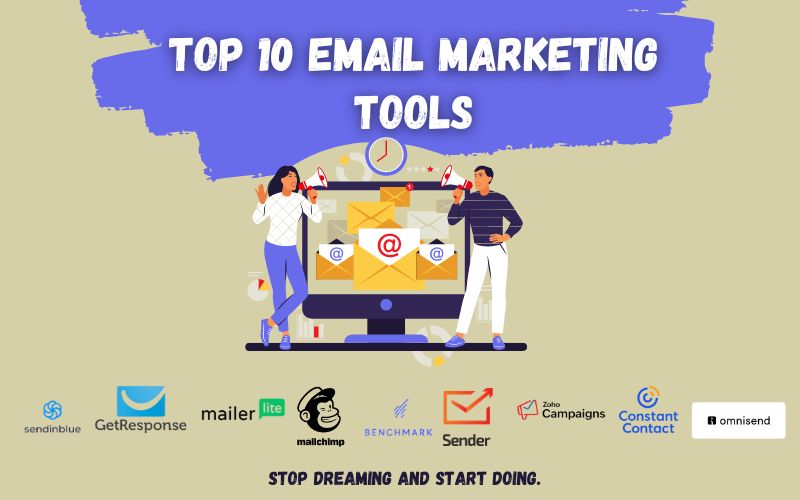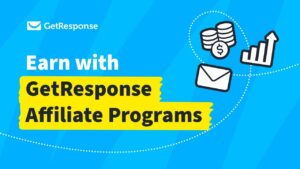Introduction:
In today’s digital age, email marketing software remains a cornerstone strategy for businesses seeking to connect with their audience, drive engagement, and achieve marketing objectives. With a plethora of email marketing software options available, choosing the right one can be daunting. In this comprehensive guide, we’ll dive into the top 10 free email marketing software solutions, comparing their features, pricing, user reviews, and success stories to help you find the perfect fit for your needs. Whether you’re a small business owner, marketer, or entrepreneur, this guide will empower you to harness the power of email marketing and unlock success for your business.
10 Best Free Email Marketing Software
- Mailchimp
- MailerLite
- GetResponse
- Sendinblue
- Benchmark Email
- Sender
- HubSpot Email Marketing
- Zoho Campaigns
- Omnisend
- Constant Contact
Mailchimp:

Mailchimp is a widely popular email marketing platform known for its user-friendly interface, robust features, and scalability. It offers a range of tools to help businesses design, send, and analyze email campaigns effectively. Here are some key details about Mailchimp:
Features:
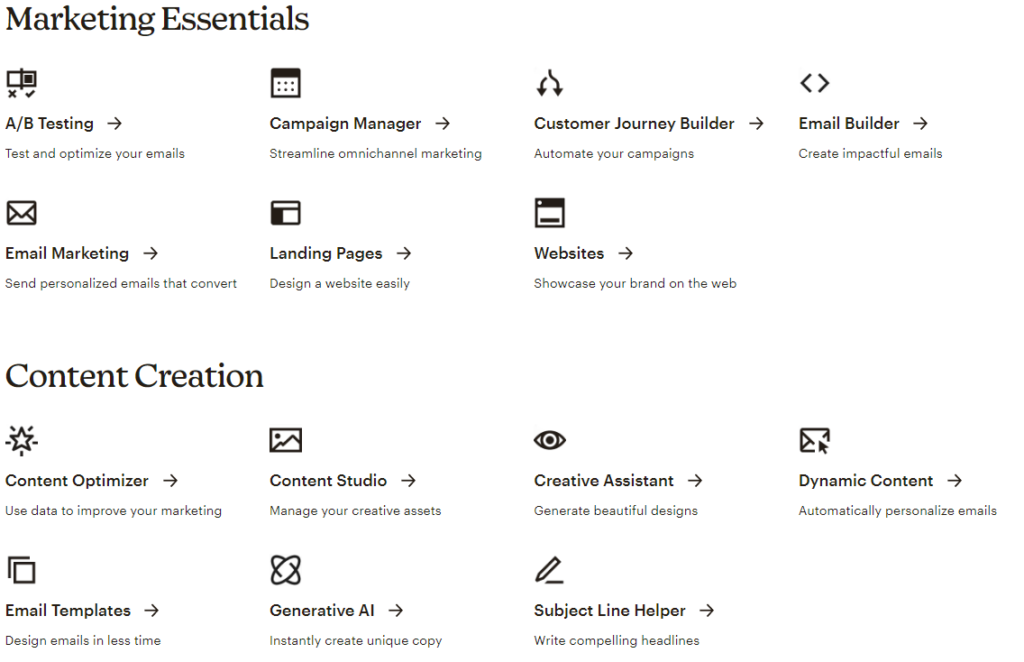
Drag-and-Drop Editor: Create visually appealing emails using Mailchimp’s intuitive drag-and-drop editor, no coding is required.
Audience Management: Manage your subscriber list with ease, segmenting audiences based on various criteria for targeted campaigns.
Automation: Set up automated email sequences to nurture leads, onboard new subscribers, or re-engage inactive customers.
Analytics: Track the performance of your email campaigns with detailed analytics, including open rates, click-through rates, and more.
Integrations: Connect Mailchimp with other tools and platforms, such as e-commerce platforms, CRMs, and social media, to streamline your marketing efforts.
Pricing:
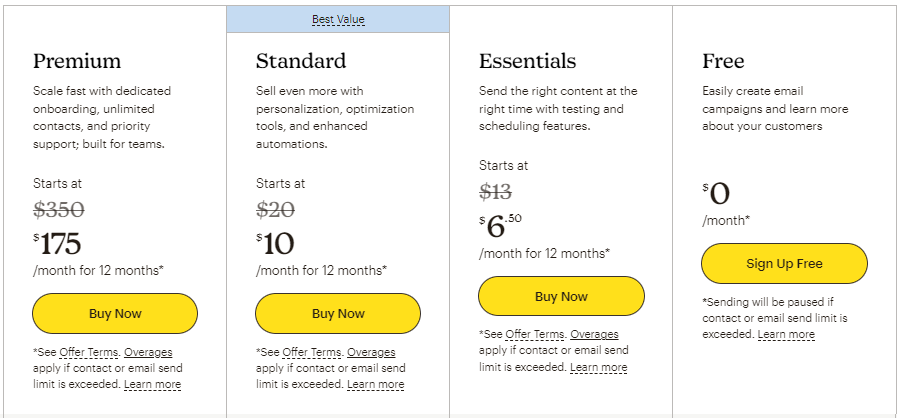
Mailchimp offers a free plan for up to 2,000 subscribers and 10,000 emails per month.
Paid plans start at $9.99 per month for the Essentials plan, which includes additional features such as advanced audience insights, custom branding, and A/B testing.
Higher-tier plans, such as Standard and Premium, offer more advanced features and increased sending limits at higher price points.
Customer Support:
Mailchimp provides comprehensive customer support through email, live chat, and extensive documentation.
Users can access help articles, tutorials, and community forums to find solutions to their queries and learn how to maximize the platform’s capabilities.
Deliverability:
Mailchimp prioritizes deliverability by adhering to industry best practices, such as authentication protocols and list hygiene practices.
The platform’s robust infrastructure and deliverability-focused features help ensure that emails reach recipients’ inboxes effectively.
User Reviews and Ratings:
Mailchimp has received positive reviews from users, who appreciate its user-friendly interface, extensive features, and responsive customer support.
The platform consistently receives high ratings for its reliability, ease of use, and effectiveness in driving results for businesses.
Mailchimp’s combination of powerful features, user-friendly interface, and scalable pricing options makes it a popular choice for businesses of all sizes looking to elevate their email marketing efforts.
MailerLite:
MailerLite is an email marketing platform that aims to simplify the process of creating and sending email campaigns for businesses of all sizes. It offers a range of features designed to streamline email marketing efforts and maximize engagement with subscribers. Here’s an overview of MailerLite’s key details:
Features:

Drag-and-Drop Editor: MailerLite provides a user-friendly drag-and-drop editor that allows users to create visually appealing email campaigns without any coding knowledge.
Automation: Users can set up automated email sequences based on subscriber actions, such as sign-ups or purchases, to nurture leads and increase conversions.
Subscriber Management: MailerLite offers tools for managing subscriber lists, including segmentation options to target specific audience segments with tailored content.
Reporting and Analytics: The platform provides detailed reports and analytics to track the performance of email campaigns, including metrics such as open rates, click-through rates, and conversion rates.
Landing Pages: In addition to email campaigns, MailerLite enables users to create custom landing pages to capture leads and drive conversions.
Pricing:
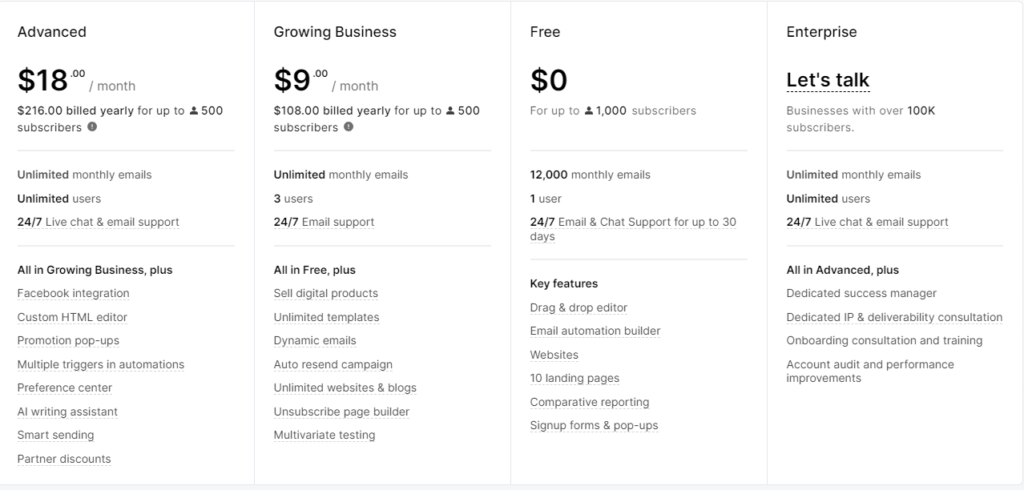
MailerLite offers a free plan with limited features, suitable for small businesses or individuals starting with email marketing.
Paid plans start at $10 per month for up to 1,000 subscribers, offering additional features such as advanced automation, custom branding, and priority support.
Higher-tier plans are available for larger subscriber lists and include features such as dedicated IP addresses and phone support.
Customer Support:
MailerLite provides responsive customer support via email and live chat to assist users with any questions or issues they may encounter.
The platform also offers extensive documentation, tutorials, and resources to help users get started and make the most of MailerLite’s features.
Deliverability:
MailerLite prioritizes deliverability by implementing best practices to ensure that emails reach subscribers’ inboxes.
The platform adheres to industry standards for email authentication and monitoring to maintain high deliverability rates and prevent emails from being marked as spam.
User Reviews and Ratings:
MailerLite has received positive reviews from users, who praise its intuitive interface, ease of use, and affordability.
Users appreciate MailerLite’s range of features, customization options, and the platform’s ability to deliver results for their email marketing campaigns.
Overall, MailerLite is a popular choice for businesses looking for a user-friendly and affordable email marketing solution. With its range of features and responsive customer support, MailerLite enables users to create effective email campaigns and engage with their audience effectively.
GetResponse:
GetResponse is a comprehensive email marketing platform that offers a wide range of features to help businesses create, send, and automate email campaigns. It is known for its user-friendly interface, advanced automation capabilities, and extensive integrations. Here’s an overview of GetResponse’s key details:
Features:
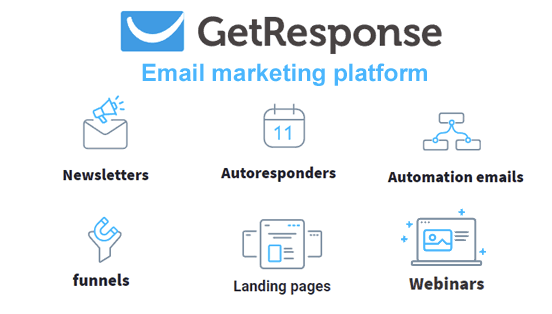
Email Marketing: GetResponse provides a drag-and-drop email editor to create visually appealing email campaigns easily. It also offers customizable templates, A/B testing, and dynamic content to engage subscribers effectively.
Automation: With GetResponse’s automation features, users can create complex workflows to segment subscribers, send personalized emails based on behavior triggers, and nurture leads through the sales funnel.
Landing Pages: GetResponse includes a landing page builder with customizable templates to create high-converting landing pages for lead generation and sales.
Webinars: The platform offers webinar hosting capabilities, allowing businesses to host live webinars, automate webinar invitations and reminders, and track attendee engagement.
Analytics: GetResponse provides in-depth analytics and reporting tools to track the performance of email campaigns, landing pages, and webinars. Users can monitor open rates, click-through rates, conversion rates, and more to optimize their marketing efforts.
Pricing:
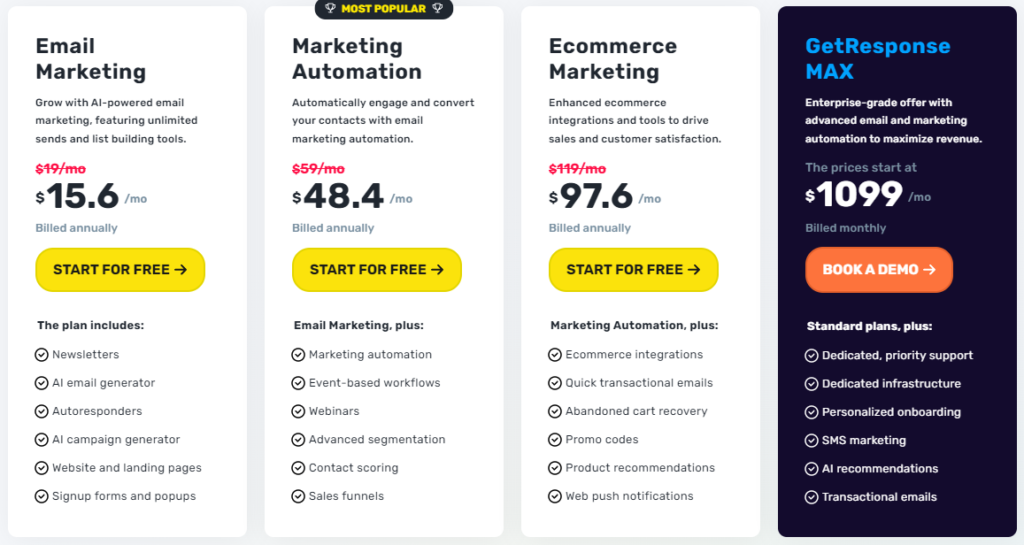
GetResponse offers various pricing plans based on the number of subscribers, starting at $15 per month for the Basic plan with up to 1,000 subscribers.
The Plus plan, starting at $49 per month, includes additional features such as an automation builder, webinars for up to 100 attendees, and advanced segmentation.
Higher-tier plans, including Professional and Enterprise, offer more advanced features such as unlimited automation workflows, webinars for up to 300 attendees, and dedicated IP addresses.
Customer Support:
GetResponse provides customer support via email, live chat, and phone to assist users with any questions or technical issues.
The platform also offers extensive documentation, tutorials, and webinars to help users learn how to use GetResponse effectively and optimize their email marketing campaigns.
Integration:
GetResponse integrates with a wide range of third-party tools and platforms, including CRM systems, e-commerce platforms, and social media platforms, to streamline workflows and maximize efficiency.
User Reviews and Ratings:
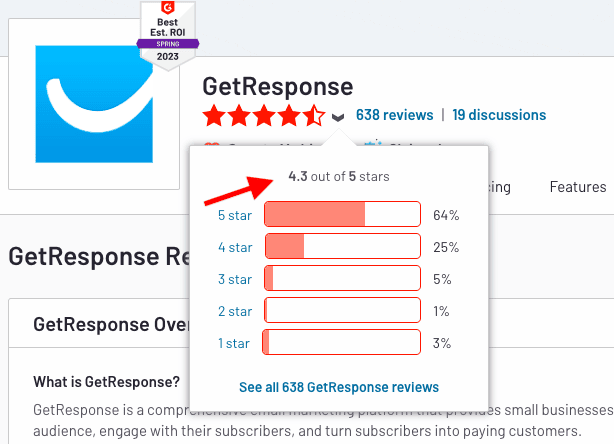
GetResponse has received positive reviews from users, who praise its ease of use, advanced features, and excellent customer support.
Users appreciate GetResponse’s comprehensive set of tools for email marketing, automation, and webinar hosting, as well as its competitive pricing compared to other platforms.
Overall, GetResponse is a robust email marketing solution suitable for businesses of all sizes. With its user-friendly interface, advanced features, and extensive integrations, GetResponse empowers businesses to create engaging email campaigns, automate marketing processes, and drive results.
Sendinblue:
Sendinblue is a versatile email marketing platform that offers a range of features to help businesses engage with their audience, automate marketing processes, and drive conversions. It is known for its user-friendly interface, competitive pricing, and excellent deliverability rates. Here’s an overview of Sendinblue’s key details:
- Features:
- Email Marketing: Sendinblue provides a drag-and-drop email editor to create visually appealing email campaigns easily. It also offers customizable templates, A/B testing, and dynamic content to personalize emails and improve engagement.
- Marketing Automation: With Sendinblue’s automation features, users can create workflows to automate email campaigns, segment subscribers based on behavior, and send targeted messages to nurture leads.
- Transactional Emails: Sendinblue allows users to send transactional emails, such as order confirmations and shipping notifications, to customers automatically.
- SMS Marketing: In addition to email marketing, Sendinblue offers SMS marketing capabilities, allowing users to send text messages to subscribers and customers.
- CRM: Sendinblue includes a built-in CRM system to manage customer relationships, track interactions, and segment contacts for personalized communication.
- Pricing:
- Sendinblue offers a free plan with limited features, suitable for small businesses or individuals starting with email marketing.
- Paid plans start at $25 per month for the Lite plan, which includes additional features such as advanced segmentation, marketing automation, and transactional email sending.
- The Premium plan, starting at $65 per month, offers additional features such as Facebook ads, landing page builder, and multi-user access.
- Customer Support:
- Sendinblue provides customer support via email and live chat to assist users with any questions or technical issues.
- The platform also offers resources such as guides, tutorials, and webinars to help users learn how to use Sendinblue effectively and optimize their email marketing campaigns.
- Integration:
- Sendinblue integrates with a wide range of third-party tools and platforms, including e-commerce platforms, CRMs, and social media platforms, to streamline workflows and maximize efficiency.
- Deliverability:
- Sendinblue prioritizes deliverability by maintaining a strong sender reputation, adhering to industry best practices, and providing tools for users to monitor engagement and improve deliverability rates.
- User Reviews and Ratings:
- Sendinblue has received positive reviews from users, who appreciate its ease of use, affordability, and reliable deliverability.
- Users praise Sendinblue’s range of features, including email marketing, automation, SMS marketing, and CRM, as well as its competitive pricing compared to other platforms.
Overall, Sendinblue is a comprehensive email marketing solution suitable for businesses looking to engage with their audience effectively, automate marketing processes, and drive results. With its user-friendly interface, competitive pricing, and range of features, Sendinblue empowers businesses to create personalized and impactful email campaigns.
Benchmark Email:
Benchmark Email is a robust email marketing platform designed to help businesses of all sizes create, send, and track email campaigns effectively. It offers a wide range of features, including customizable templates, automation tools, and advanced reporting capabilities. Here’s an overview of Benchmark Email’s key details:
Features:
Email Marketing: Benchmark Email provides a user-friendly drag-and-drop editor to create professional-looking email campaigns easily. It offers a library of customizable templates, A/B testing, and dynamic content to engage subscribers effectively.
Automation: With Benchmark Email’s automation features, users can create automated email sequences based on subscriber actions or time triggers. This allows businesses to nurture leads, onboard new subscribers, and re-engage inactive customers automatically.
List Management: Benchmark Email includes tools for managing subscriber lists, segmenting audiences, and cleaning email lists to ensure high deliverability rates.
Reporting and Analytics: The platform provides detailed reports and analytics to track the performance of email campaigns, including open rates, click-through rates, conversion rates, and more. Users can use this data to optimize their campaigns and improve ROI.
Landing Pages: Benchmark Email offers a landing page builder with customizable templates to create high-converting landing pages for lead generation and sales.
Pricing:
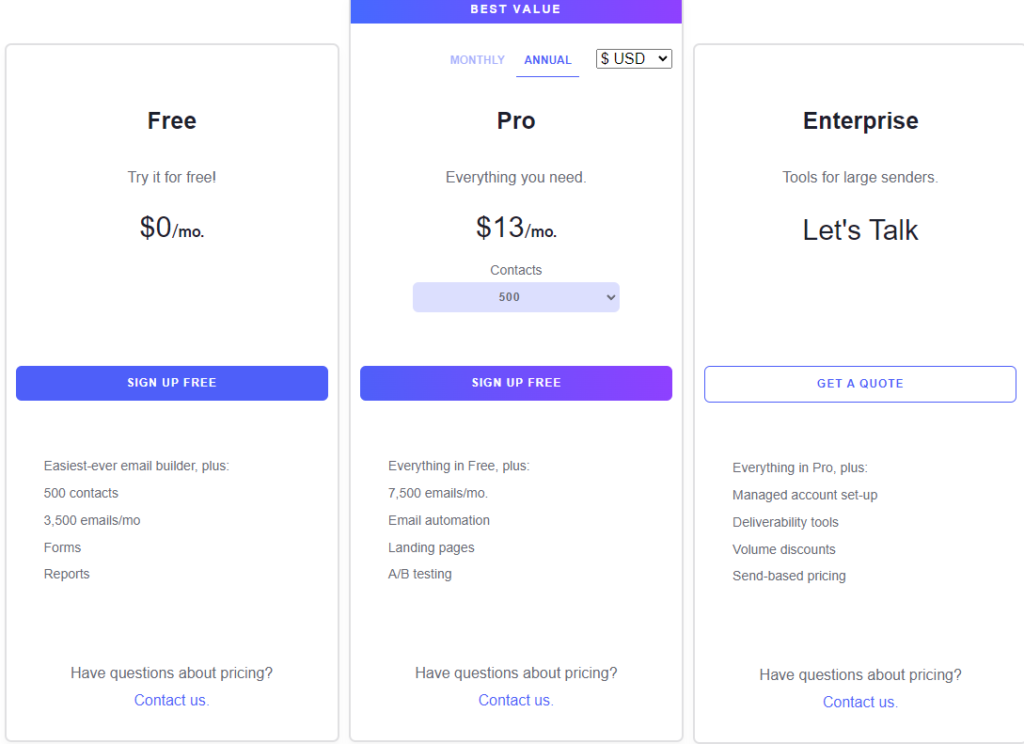
Benchmark Email offers a free plan with limited features, suitable for small businesses or individuals starting with email marketing.
Paid plans start at $13.99 per month for the Pro plan, which includes additional features such as automation pro, A/B testing, and advanced reporting.
The Enterprise plan, starting at $429.99 per month, offers additional features such as surveys, coupons, and event marketing, along with dedicated account management and priority support.
Customer Support:
Benchmark Email provides responsive customer support via email, live chat, and phone to assist users with any questions or technical issues.
The platform also offers extensive documentation, tutorials, and webinars to help users learn how to use Benchmark Email effectively and optimize their email marketing campaigns.
Integration:
Benchmark Email integrates with a wide range of third-party tools and platforms, including CRM systems, e-commerce platforms, and social media platforms, to streamline workflows and maximize efficiency.
User Reviews and Ratings:
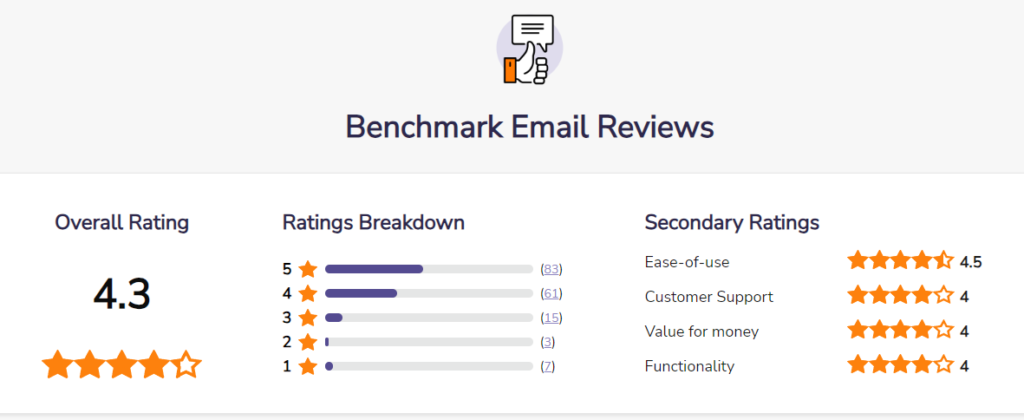
Benchmark Email has received positive reviews from users, who appreciate its user-friendly interface, customizable templates, and robust automation features.
Users praise Benchmark Email for its comprehensive set of tools for email marketing, automation, and reporting, as well as its responsive customer support and competitive pricing compared to other platforms.
Overall, Benchmark Email is a reliable email marketing solution suitable for businesses looking to create engaging email campaigns, automate marketing processes, and track performance effectively. With its range of features, customizable templates, and responsive customer support, Benchmark Email empowers businesses to achieve their email marketing goals and drive results.
Sender:
Sender is a user-friendly email marketing platform that offers powerful features to help businesses create, send, and track email campaigns with ease. It is known for its intuitive interface, customizable templates, and advanced automation capabilities. Here’s an overview of Sender’s key details:
Features:
Email Marketing: Sender provides a drag-and-drop editor that allows users to create professional-looking email campaigns quickly and easily. It offers customizable templates, A/B testing, and dynamic content to engage subscribers effectively.
Automation: With Sender’s automation features, users can set up automated email sequences based on subscriber actions or time triggers. This allows businesses to nurture leads, welcome new subscribers, and re-engage inactive customers automatically.
Subscriber Management: Sender includes tools for managing subscriber lists, segmenting audiences, and personalizing email content to improve engagement and deliverability.
Reporting and Analytics: The platform provides detailed reports and analytics to track the performance of email campaigns, including open rates, click-through rates, conversion rates, and more. Users can use this data to optimize their campaigns and improve ROI.
Integration: Sender integrates with a variety of third-party tools and platforms, including CRM systems, e-commerce platforms, and social media platforms, to streamline workflows and maximize efficiency.
Pricing:
Sender offers a free plan with limited features, suitable for small businesses or individuals starting with email marketing.
Paid plans start at $10 per month for the Standard plan, which includes additional features such as advanced automation, A/B testing, and priority support.
The Pro plan, starting at $34 per month, offers additional features such as a custom SMTP server, white labeling, and dedicated IP addresses.
Customer Support:
Sender provides responsive customer support via email and live chat to assist users with any questions or technical issues.
The platform also offers extensive documentation, tutorials, and webinars to help users learn how to use Sender effectively and optimize their email marketing campaigns.
Deliverability:
Sender prioritizes deliverability by maintaining a strong sender reputation and adhering to industry best practices for email marketing.
The platform’s deliverability-focused features and tools help ensure that emails are successfully delivered to subscribers’ inboxes and avoid being marked as spam.
User Reviews and Ratings:
Sender has received positive reviews from users, who appreciate its user-friendly interface, customizable templates, and advanced automation capabilities.
Users praise Sender for its affordability, reliability, and effectiveness in driving results for their email marketing campaigns.
HubSpot Email Marketing:
HubSpot Email Marketing is a robust email marketing platform that empowers businesses to create, send, and analyze email campaigns effectively. Renowned for its user-friendly interface, advanced automation capabilities, and comprehensive CRM integration, HubSpot Email Marketing is a preferred choice for marketers seeking to drive engagement and conversions. Here’s an in-depth look at its key features:
Email Creation:
HubSpot Email Marketing offers a seamless drag-and-drop editor, enabling users to design visually appealing email campaigns without any coding knowledge.
Customizable templates, A/B testing, and dynamic content options allow for personalized and engaging email communications.
Automation:
With HubSpot’s automation features, users can create sophisticated workflows to automate email campaigns based on subscriber behavior, demographics, or specific triggers.
Automated email sequences facilitate lead nurturing, customer onboarding, and targeted messaging, driving conversions and fostering long-term relationships.
CRM Integration:
HubSpot Email Marketing seamlessly integrates with HubSpot’s CRM platform, providing users with a unified view of their contacts and interactions.
CRM data enables personalized email content, segmentation, and lead scoring, facilitating more effective targeting and communication.
Analytics and Reporting:
Detailed analytics and reporting tools offer insights into email campaign performance, including open rates, click-through rates, and conversion metrics.
Users can track engagement metrics, measure ROI, and refine strategies to optimize campaign effectiveness.
Personalization:
HubSpot Email Marketing enables advanced personalization through dynamic content and smart segmentation.
Tailored messaging based on subscriber preferences, behaviors, and lifecycle stages enhances engagement and drives action.
Pricing:
HubSpot Email Marketing is available as part of the HubSpot CRM platform, offering a free plan with limited features.
Paid plans start at $45 per month for the Starter plan, with additional features such as custom branding, A/B testing, and advanced reporting.
The Professional plan, starting at $800 per month, offers advanced automation, smart content, and predictive lead-scoring capabilities.
Customer Support:
HubSpot provides comprehensive customer support through email, live chat, and phone, ensuring users receive timely assistance with their queries and technical issues.
Extensive documentation, tutorials, and training resources empower users to maximize the potential of HubSpot Email Marketing for their campaigns.
Integration:
HubSpot Email Marketing integrates seamlessly with various third-party tools and platforms, including CRMs, e-commerce systems, and social media platforms, streamlining workflows and data synchronization.
Zoho Campaigns:
Zoho Campaigns is an email marketing platform designed to help businesses of all sizes create, send, and track email campaigns efficiently. With its intuitive interface, advanced automation features, and comprehensive analytics, Zoho Campaigns enables marketers to engage with their audience effectively and drive results. Here’s an overview of Zoho Campaigns’ key details:
Features:
Email Creation: Zoho Campaigns offers a user-friendly drag-and-drop editor, allowing users to create visually appealing email campaigns without any coding knowledge. Customizable templates and personalization options enhance engagement and relevancy.
Automation: With Zoho Campaigns’ automation features, users can set up automated email workflows based on subscriber actions, time triggers, or custom criteria. This facilitates lead nurturing, customer onboarding, and targeted messaging.
Subscriber Management: Zoho Campaigns provides tools for managing subscriber lists, segmenting audiences, and cleaning email lists to ensure high deliverability rates. Custom fields and tags enable personalized communication with subscribers.
Analytics and Reporting: The platform offers detailed reports and analytics to track the performance of email campaigns, including open rates, click-through rates, conversion rates, and more. Users can gain valuable insights to optimize their campaigns and improve ROI.
Integration: Zoho Campaigns integrates seamlessly with various third-party tools and platforms, including CRMs, e-commerce systems, and social media platforms, to streamline workflows and enhance productivity.
Pricing:
Zoho Campaigns offers flexible pricing plans based on the number of subscribers, starting at $3 per month for up to 500 subscribers.
Paid plans include additional features such as advanced automation, A/B testing, and custom branding, with pricing tiers available for businesses of all sizes.
The platform also offers a free plan with limited features, allowing users to get started with email marketing at no cost.
Customer Support:
Zoho Campaigns provides responsive customer support via email, live chat, and phone to assist users with any questions or technical issues.
The platform also offers comprehensive documentation, tutorials, and training resources to help users learn how to use Zoho Campaigns effectively and optimize their email marketing campaigns.
Deliverability:
Zoho Campaigns prioritizes deliverability by adhering to industry best practices and maintaining a strong sender reputation.
The platform provides tools for users to monitor engagement rates, manage bounces and unsubscribes, and ensure that emails are successfully delivered to subscribers’ inboxes.
User Reviews and Ratings:
Zoho Campaigns has received positive reviews from users, who appreciate its ease of use, affordability, and comprehensive feature set.
Users praise Zoho Campaigns for its customizable templates, advanced automation capabilities, and responsive customer support, making it a popular choice for businesses looking to streamline their email marketing efforts.
Omnisend:
Omnisend is a powerful omnichannel marketing automation platform specifically designed for e-commerce businesses. It offers a comprehensive suite of features to help businesses engage with their audience across multiple channels, including email, SMS, push notifications, and more. Here’s an overview of Omnis end’s key details:
Features:
Email Marketing: Omnisend provides a user-friendly email editor with customizable templates, allowing users to create visually stunning email campaigns effortlessly. Advanced segmentation and personalization options enable targeted messaging for increased engagement and conversions.
Automation: With Omnisend’s automation workflows, users can set up automated email sequences based on customer behavior, lifecycle stage, or specific triggers. This includes welcome series, abandoned cart reminders, and post-purchase follow-ups to nurture leads and drive sales.
Omni-Channel Marketing: Omnisend enables businesses to reach customers across multiple channels, including SMS, push notifications, Facebook Messenger, and more. This omnichannel approach allows for seamless communication and increased customer engagement.
Segmentation and Personalization: Omnisend offers advanced segmentation capabilities, allowing users to segment their audience based on demographics, behavior, purchase history, and more. Personalized content and product recommendations enhance the customer experience and drive conversions.
Analytics and Reporting: The platform provides detailed analytics and reporting tools to track the performance of email campaigns, automation workflows, and other marketing activities. Users can measure key metrics such as open rates, click-through rates, and revenue generated to optimize their strategies.
Pricing:
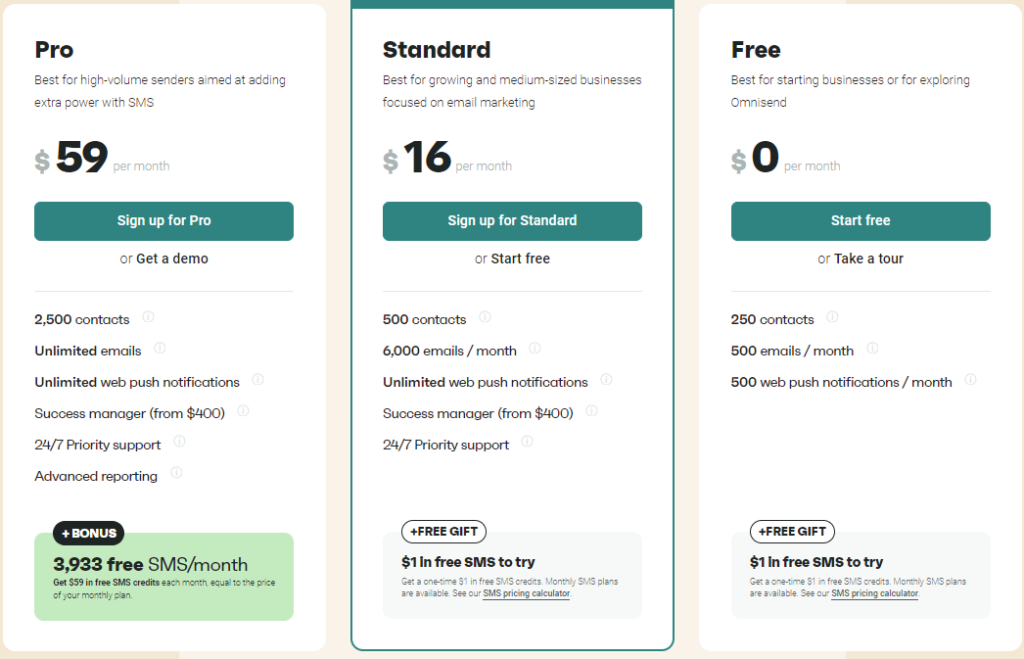
Omnisend offers flexible pricing plans based on the number of subscribers, starting at $16 per month for the Standard plan.
Paid plans include additional features such as advanced automation, SMS marketing, and custom branding, with pricing tiers available for businesses of all sizes.
The platform also offers a free plan with limited features, allowing users to get started with email marketing at no cost.
Customer Support:
Omnisend provides dedicated customer support via email, live chat, and phone to assist users with any questions or technical issues.
The platform also offers comprehensive documentation, tutorials, and training resources to help users learn how to use Omnisend effectively and maximize their marketing efforts.
Integration:
Omnisend integrates seamlessly with popular e-commerce platforms such as Shopify, WooCommerce, Magento, and more, allowing for easy data synchronization and workflow automation.
The platform also integrates with third-party tools and services, including CRMs, analytics platforms, and social media platforms, to streamline marketing processes and enhance productivity.
User Reviews and Ratings:
Omnisend has received positive reviews from users, who praise its ease of use, advanced features, and excellent customer support.
Users appreciate Omnisend’s omnichannel capabilities, advanced automation workflows, and customizable templates, making it a preferred choice for e-commerce businesses looking to scale their marketing efforts.
Constant Contact:
Constant Contact is a leading email marketing platform that provides businesses with the tools they need to create, send, and track professional email campaigns. Known for its user-friendly interface, robust features, and excellent customer support, Constant Contact is a popular choice for businesses of all sizes. Here’s a detailed overview of Constant Contact’s key features:
Email Creation:
Constant Contact offers a simple drag-and-drop editor that allows users to create visually appealing email campaigns quickly and easily.
The platform provides customizable templates, stock images, and access to a library of royalty-free images, enabling users to create professional-looking emails without any design experience.
Automation:
Constant Contact’s automation features enable users to set up automated email series based on triggers such as subscriber sign-up, birthdays, or anniversary dates.
Users can create targeted email campaigns that deliver the right message to the right people at the right time, increasing engagement and driving conversions.
List Management:
Constant Contact provides tools for managing email lists, including list segmentation, tagging, and list hygiene features.
Users can easily import contacts from various sources, segment them based on criteria such as demographics or engagement, and personalize their email campaigns for better results.
Analytics and Reporting:
Constant Contact offers robust analytics and reporting tools that allow users to track the performance of their email campaigns in real time.
Users can monitor key metrics such as open rates, click-through rates, and conversion rates, and use this data to optimize their campaigns for better results.
Integration:
Constant Contact integrates seamlessly with a wide range of third-party tools and platforms, including CRMs, e-commerce platforms, and social media networks.
Users can connect Constant Contact with their favorite tools to streamline their workflow, sync customer data, and improve campaign effectiveness.
Customer Support:
Constant Contact provides dedicated customer support via phone, email, and live chat to assist users with any questions or technical issues.
The platform also offers extensive online resources, including tutorials, guides, and webinars, to help users get the most out of their email marketing efforts.
Pricing:
Constant Contact offers tiered pricing plans based on the number of contacts, starting at $20 per month for up to 500 contacts.
Paid plans include additional features such as advanced automation, e-commerce integrations, and dedicated support, with higher-tier plans available for larger businesses.
In conclusion, choosing the right email marketing software is crucial for businesses to effectively reach and engage their target audience, drive conversions, and ultimately achieve their marketing goals. In this comprehensive guide, we’ve explored the top 10 free email marketing software options, comparing them based on various factors such as pricing, features, ease of use, template design, list management, automation, reporting and analytics, integration, customer support, deliverability, user reviews and ratings, as well as case studies or success stories.
Each of the email marketing software options reviewed in this guide offers unique features and benefits, catering to the diverse needs and preferences of businesses of all sizes and industries. Whether you’re looking for an intuitive drag-and-drop editor, robust automation capabilities, seamless integration with other tools and platforms, or responsive customer support, there’s a solution available to suit your requirements.
Before making a decision, it’s essential to carefully evaluate your business objectives, budget, and specific requirements, and consider factors such as deliverability rates, user experience, and scalability. Additionally, leveraging user reviews, case studies, and free trials can provide valuable insights and help you make an informed decision.
Regardless of which email marketing software you choose, it’s important to continually monitor and optimize your email campaigns, track key performance metrics, and adapt your strategies based on insights and feedback. By harnessing the power of email marketing software effectively, businesses can drive engagement, foster customer relationships, and achieve sustainable growth in today’s competitive digital landscape.
Remember, the success of your email marketing efforts ultimately depends on the relevance, value, and personalization of your content, as well as your ability to deliver it to the right audience at the right time. With the right email marketing software and a strategic approach, you can unlock new opportunities, drive results, and propel your business forward in the ever-evolving digital marketplace.


